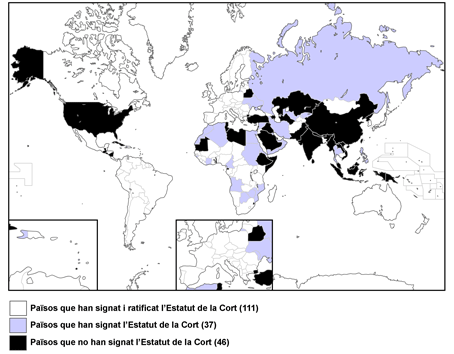In depth
The geography of the International Criminal Court

The International Criminal Court (or the ICC) has a universal commitment. However, after the adoption of the Court Statute, in 1998, it took four years to obtain the 60 ratifications necessary for its entry into force, in July 2002. 111 states have signed and ratified the statute, 37 countries have signed it but have yet to ratify it, and 46 countries have done neither. As the map below shows, there is a great deal of imbalance in the geographic distribution.
The region most obviously favorable to the Court is Western Europe. With the sole exceptions of Monaco and the Vatican City, all the countries are party to it. The response in Central and Eastern Europe is less unanimous: there are 17 countries that are party to it, and seven signatories who have not ratified it, including the Russian Federation. There are also five countries that have yet to sign or ratify it, including Turkey and Belarus.
The next region in terms of members of the Court is America: all the countries (25) are members, except for four Caribbean states who have signed but not ratified it, and another six who have not signed it, including the USA, Cuba and some Central American countries. The case of the USA is unusual, as it signed the treaty on the last day of President Clinton's term of office. However, in May 2002, during the presidency of George W. Bush, the USA sent a letter to the UN Secretary-General withdrawing its signature. Israel did the same a few weeks later.
Making a geographical distinction in Africa is easy: the sub-Saharan countries are mostly in favor of the Court, as can be seen by the large number of ratifications (30); this is despite the failure of some countries to ratify it (11), and the fact that some that have not signed it (7). However, in North Africa there is not a single member state of the Court; some countries (4) have signed and others (4) have not. The situation is very similar in the Middle East, where only Jordan is a member country of the Court.
The rest of Asia and Oceania are also mostly opposed to the ICC. Only 14 countries - including Australia, Japan, New Zealand and South Korea - have signed and ratified the treaty; only three states are awaiting ratification. Finally, almost half the world's countries that have not signed or ratified are in these continents (23 out of 47).
Action by the International Criminal Court:
A geographical overview of the countries where the ICC has taken action is striking: the four cases begun so far, as well as the one being considered, apply to Africa:
Democratic Republic of the Congo: This became the first case investigated by the Court when the prosecutor Moreno-Ocampo threatened to begin enquiries. In November 2003, the Congolese authorities asked the Court to intervene, making it into a case filed by a member country of the ICC. The accusations are against four commanders of various rebel groups in the east of the country.
Uganda: In December 2003, the President of Uganda asked the prosecutor to investigate the actions of the rebel forces called the Lord's Resistance Army. The accusations were presented against four commanders of this guerrilla force.
Central African Republic: This is the first case undertaken in which sexual crimes exceed the number of murders. The Central African Republic government referred the case to the prosecutor. The first accusation is against Jean Pierre Bemba, ex-vice president of the Democratic Republic of the Congo. The charges against Bemba relate to his time as leader of the Movement for the Liberation of Congo, and he is accused of invading the Central African Republic in order to provide support for ex-president Patassé:
Kenya: In November 2009, the prosecutor asked the Pre-Trial Chambers for permission to begin work on the case on an ex motu basis. The Chambers recently approved the investigation.
Some conclusions may be drawn regarding the geographical scope and the actions carried out by the ICC:
The Court is not a universal tribunal: neither the world's most powerful country nor the most populous continent are areas favorable to the ICC. North Africa, the Middle East, the rest of Asia and Oceania are regions where the member countries of the Court are in a minority or even an exception. It is necessary to work towards a world in which an overwhelming majority of ICC Member States make the pressure involved in remaining outside the court heavier than that involved in ratifying the treaty.
Meanwhile, three of the five cases currently under way are the result of requests by the governments concerned. The subsidiary character of the ICC is mentioned in the Rome Statute, but it was not originally considered that its main task would be to provide support for justice administrations unable to judge the serious crimes committed within their own territory. Despite not sitting in judgment on dictators, it will be a positive development if it acts - in whatever way - against impunity. However, the Court's bias towards Africa is still surprising ... all are serious violations only committed on that continent?